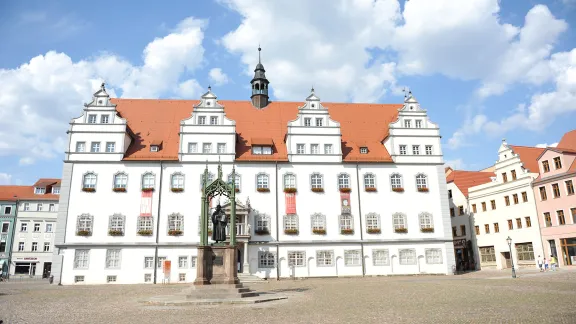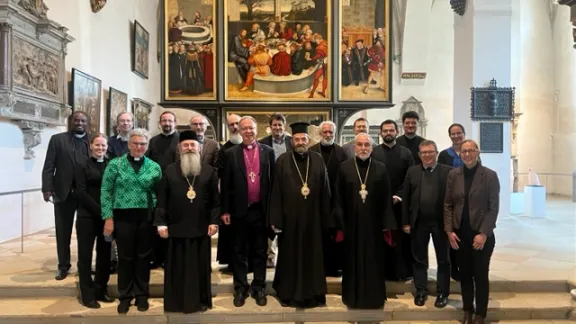Lutherans and Orthodox theologians meet in Wittenberg to explore the role of the Holy Spirit and to work on a joint document due to mark the 1700th anniversary of the Council of Nicaea.

The old market square in Wittenberg, Germany, where the Lutheran Orthodox Joint Commission held its plenary meeting. Photo: LWF/M. Renaux
A plenary meeting in Wittenberg focused on the role and work of the Holy Spirit
(LWI) - The work of the Holy Spirit in creation, environmental concerns, the Holy Spirit in the world and the role of the Holy Spirit within the Church were among the topics under the spotlight during a recent meeting of Lutherans and Orthodox in the German city of Wittenberg where reformers Martin Luther and Philipp Melanchthon lived, worked and preached.
The plenary meeting of the International Joint Commission on the Theological Dialogue between the Lutheran World Federation (LWF) and the Orthodox Church (under the leadership of the Ecumenical Patriarch) took place from 29 April to 6 May. Hosted by the LWF with the support of the Evangelical Church in Central Germany, it included visits to churches and other historic sites connected to the Reformation.
The meeting focused on the theme of ‘The Holy Spirit, the Church and the World: Creation, Humankind and Salvation’, with participants working towards the drafting of a common statement due for publication in 2025, the year that the Christian world will mark the 1700th anniversary of the Council of Nicaea. That ecumenical council in 325 CE marked the first effort by church leaders to reach consensus on Christian doctrine and practices.

Members of the Commission gather in front of the Reformation Altar in the City Church of Wittenberg where Martin Luther preached. Photo: LWF
LWF Assistant General Secretary for Ecumenical Relations, Prof. Dr Dirk Lange said: “The discussion was very constructive and the conversation very engaging. It was a joy to experience the commitment and the honest searching of all members of the Commission. The two co-chairs, His Eminence Kyrillos of Kirini and Regional Bishop Johann Schneider facilitated a very focused and lively meeting.”
During the meeting, messages were received from the Ecumenical Patriarch Barthlomew I and from LWF General Secretary Rev. Dr Anne Burghardt, celebrating the progress of Lutheran-Orthodox theological dialogues which began over 40 years ago. The encounter included a Service of the Word at the Castle Church in Wittenberg and a Lutheran Eucharist celebrated at Naumburg Cathedral.
Epiclesis, the invocation or calling down of the Holy Spirit over bread and wine and over the gathered assembly during the Eucharistic Prayer, was the focal point of much discussion and it is central to Orthodox liturgical and ecclesial understanding. Martin Luther included a form of it in his German Mass, but because it did not exist in the Catholic Mass of Luther’s Day, it was not highlighted. Over the past 100 years, the Epiclesis has found its place again in many Protestant liturgies, notably through liturgical renewal in the mid-20th century in North America and in Sweden.
Seeking convergence to heal deep divisions
Participants also engaged in “lively discussion” around the key issue of the ‘Filioque’ clause. This debate was originally occasioned by the addition of the phrase “and from the Son” into the Nicene Creed in the late 6th century by the Latin or western Church, but the phrase has caused deep division between Eastern and Western Christianity.
Commission members explored the “differing theological frameworks, liturgical consequences, and possible convergences,” agreeing to pursue “a lengthier study process with pastoral implications” at their next meeting. The LWF has already recommended that the Filioque clause be omitted during ecumenical worship services. This was the case when Prof. Lange presided at the Lutheran liturgy in Naumburg Cathedral.
The next preparatory session of the Commission will be hosted by the LWF from 6 to 19 November in the Estonian capital, Tallinn.


